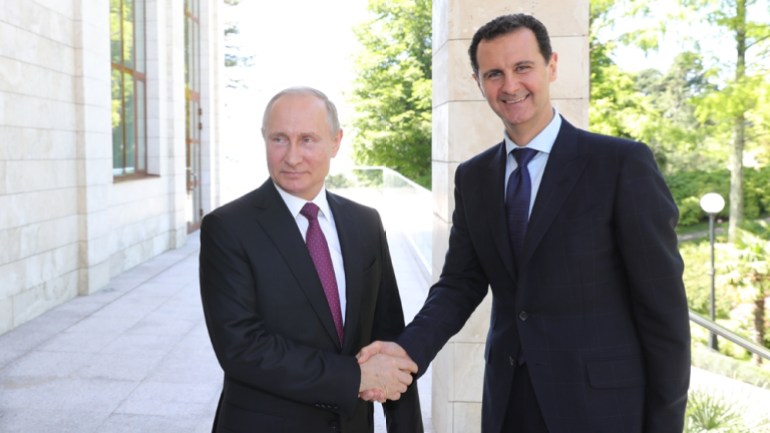The decision to grant asylum to Bashar al-Assad comes amid concerns over Russian military bases in Syria.
Kremlin spokesman Dmitry Peskov has confirmed that removed Syrian President Bashar al-Assad was given asylum in Russia as he fled a lightning advance by opposition forces, saying the decision was made personally by President Vladimir Putin.
“Of course, such decisions cannot be made without the head of state. It is his [Putin’s] decision,” Peskov told reporters in Moscow on Monday. However, he declined to comment on al-Assad’s specific whereabouts and said Putin was not planning to meet with him.
“The Russian authorities have granted political asylum,” said Al Jazeera’s Yulia Shapovalova, reporting from Moscow. “We see reports on our end that Russia has not abandoned the resigned Syrian president in such difficult circumstances. Al-Assad was allegedly evacuated by a Russian plane from the Russian airbase in Latakia.”
Shapovalova said it remained to be seen how the decision to grant the former leader asylum would affect Russia and its assets in Syria.
“The most important question is the fate of Russian military bases,” namely a naval base in Tartous and an airbase in Hmeimim, Latakia, Shapovalova said.
Our reporter added that the Kremlin was taking precautions to ensure its personnel’s safety but that incoming reports from Tartous suggested no imminent threat.
The Kremlin said it was premature to say what the future would hold for Russia’s military bases in Syria. “This is all a subject for discussion with those who will be in power in Syria,” Peskov said.
The Tartous facility is Russia’s only Mediterranean repair and replenishment hub, and Moscow has used Syria as a staging post to fly its military contractors in and out of countries in Africa.
Speaking about the broader regional and international situation, the Kremlin spokesman added that he saw a turbulent time ahead with a high potential for conflict. “We see the situation around Ukraine, we see many contradictory statements in this regard, we see a growing conflict potential in other regions, we can say the burning Middle East,” he said.
Concerns rise around future Syria leadership
The lightning advance of an opposition alliance spearheaded by Hayat Tahrir al-Sham (HTS), a former al-Qaeda affiliate, surprised the world on Sunday and Russia was no exception.
HTS is still designated as a terrorist group by the United Nations and most countries, but has spent years trying to soften its image and distance itself from its al-Qaeda roots to reassure foreign states and minority groups within Syria.
Peskov said Moscow was in contact with Ankara and other regional players on the situation in Syria and that Russia was ready for dialogue with all countries of the region in the face of the instability that lies ahead.
Russia, Turkiye and Iran have regularly held talks on Syria’s future in a trilateral format as part of what is known as the Astana peace process.
Al-Assad’s fall destroyed one of the main bastions from which Iran and Russia wielded power across the region. Turkiye, long aligned with al-Assad’s foes, emerged strengthened, while Israel hailed it as an outcome of its blows to al-Assad’s Iranian-backed allies.
On Monday the Israeli military published photos of its forces in the Mount Hermon border area. It said it was carrying out air attacks on suspected chemical weapons sites and long-range rockets to keep them from falling into the hands of the opposition fighters.
Israel struck sites linked to Iran in Syria on Sunday and pushed tanks over the border into a demilitarised buffer zone to prevent a spillover from the turmoil there, but said it intended to stay out of the conflict.
